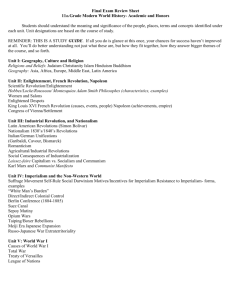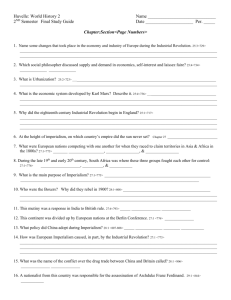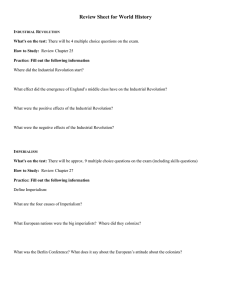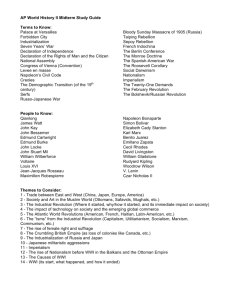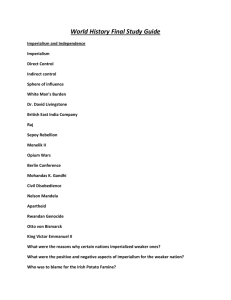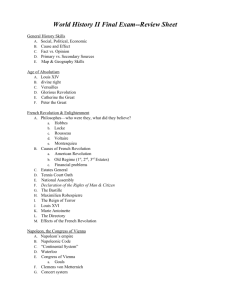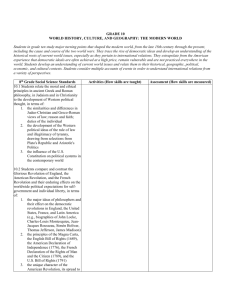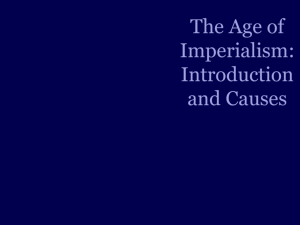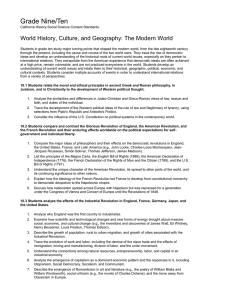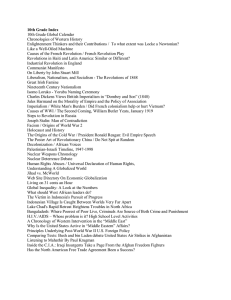Lesson Aims and Lesson Calendar for Global 10 (Michelle Maniscalco,...
advertisement
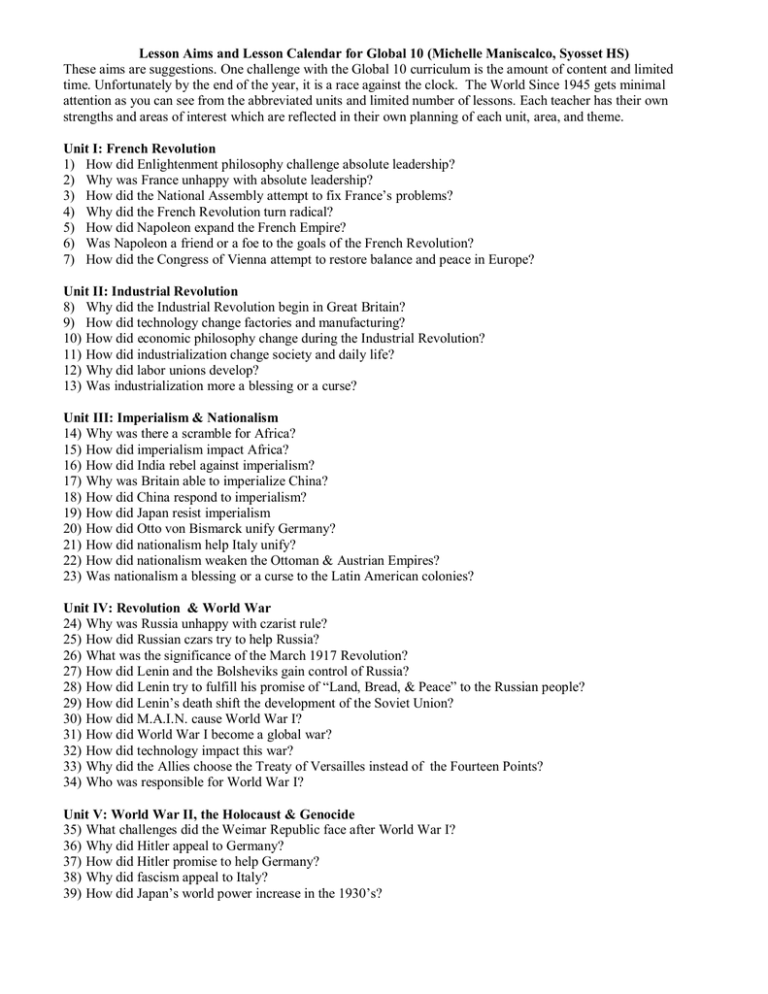
Lesson Aims and Lesson Calendar for Global 10 (Michelle Maniscalco, Syosset HS) These aims are suggestions. One challenge with the Global 10 curriculum is the amount of content and limited time. Unfortunately by the end of the year, it is a race against the clock. The World Since 1945 gets minimal attention as you can see from the abbreviated units and limited number of lessons. Each teacher has their own strengths and areas of interest which are reflected in their own planning of each unit, area, and theme. Unit I: French Revolution 1) How did Enlightenment philosophy challenge absolute leadership? 2) Why was France unhappy with absolute leadership? 3) How did the National Assembly attempt to fix France’s problems? 4) Why did the French Revolution turn radical? 5) How did Napoleon expand the French Empire? 6) Was Napoleon a friend or a foe to the goals of the French Revolution? 7) How did the Congress of Vienna attempt to restore balance and peace in Europe? Unit II: Industrial Revolution 8) Why did the Industrial Revolution begin in Great Britain? 9) How did technology change factories and manufacturing? 10) How did economic philosophy change during the Industrial Revolution? 11) How did industrialization change society and daily life? 12) Why did labor unions develop? 13) Was industrialization more a blessing or a curse? Unit III: Imperialism & Nationalism 14) Why was there a scramble for Africa? 15) How did imperialism impact Africa? 16) How did India rebel against imperialism? 17) Why was Britain able to imperialize China? 18) How did China respond to imperialism? 19) How did Japan resist imperialism 20) How did Otto von Bismarck unify Germany? 21) How did nationalism help Italy unify? 22) How did nationalism weaken the Ottoman & Austrian Empires? 23) Was nationalism a blessing or a curse to the Latin American colonies? Unit IV: Revolution & World War 24) Why was Russia unhappy with czarist rule? 25) How did Russian czars try to help Russia? 26) What was the significance of the March 1917 Revolution? 27) How did Lenin and the Bolsheviks gain control of Russia? 28) How did Lenin try to fulfill his promise of “Land, Bread, & Peace” to the Russian people? 29) How did Lenin’s death shift the development of the Soviet Union? 30) How did M.A.I.N. cause World War I? 31) How did World War I become a global war? 32) How did technology impact this war? 33) Why did the Allies choose the Treaty of Versailles instead of the Fourteen Points? 34) Who was responsible for World War I? Unit V: World War II, the Holocaust & Genocide 35) What challenges did the Weimar Republic face after World War I? 36) Why did Hitler appeal to Germany? 37) How did Hitler promise to help Germany? 38) Why did fascism appeal to Italy? 39) How did Japan’s world power increase in the 1930’s? 40) Why was global peace threatened again? 41) How did the Allies win World War II? 42) Was World War II a just war? 43) Was the cost of World War II worth the effects? 44) How can we assess responsibility for the Holocaust? 45) How did individuals and small groups resist the Nazis and rescue victims? 46) How can individuals, schools, nations, and the international community remember the Holocaust and prevent future genocides? Students complete a research project analyzing other genocides (Armenia, Kurds, Cambodia, Irish Potato Famine, etc). They need to identify victims, persecutors, causes, and the world’s reaction or inaction. Unit VI: Europe Recovers From Another Global Conflict 47) How successfully did Great Britain recover from World War II? 48) How did Germany recover from NAZI rule? 49) How did Japan’s economic miracle impact their role in the global community? 50) Will Europe become the United States of Europe? Unit VII: The United States, the Soviet Union & the Cold War 51) How did the Soviet Union create an empire? 52) How did tension increase between the Soviet Union and the United States? 53) How did the Cold War almost become a “hot war”? 54) Was U.S. involvement in Korea successful? 55) Was the Cuban Missile Crisis an act of containment? 56) Was U.S. involvement in Vietnam justified? 57) How did Soviet leadership after Stalin change? 58) Why were Gorbachev’s programs unsuccessful? 59) How did the Soviet Union collapse? 60) Was Soviet life better after communism? Unit VIII: The Non-Western World Demands Independence (China, India, Africa, 1945-present) 61) Why did dynastic rule end in China? 62) Who struggled for control of China after dynastic rule ended? 63) How did the Long March help communists gain support? 64) How did Mao reorganize China after 40 years of civil war? 65) How successful were Deng Xiaoping’s programs? 66) Can China be a world power? or Does China deserve to host the 2008 Olympics? 67) How did Gandhi help India gain independence? 68) How did India struggle with life after Gandhi? 69) How did African nations gain independence after 1945? 70) What challenges did Africa face after independence? 71) How did apartheid end in South Africa? Unit IX: The Non-Western World Demands Independence (The Middle East and Latin America) 72) How did Israel become a nation? 73) What are the roots of the Middle East Conflict? 74) Why have peace attempts in the Middle East been unsuccessful? 75) What struggles does Latin America face today? 76) Why has Latin America had such difficulty achieving democracy? 77) Why is social and economic inequality still a problem in Latin America today? 78) What is Latin America’s role in the global community? Unit X: Global Issues This unit is done as a project. The students research issues, who it impacts, why is it a concern and how is it being resolved.
